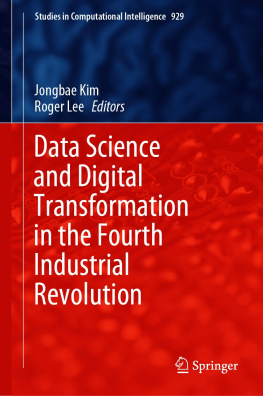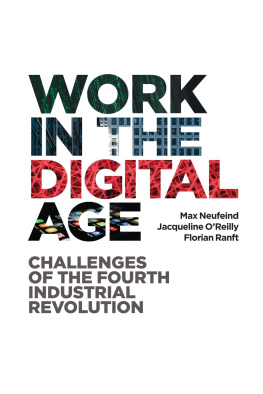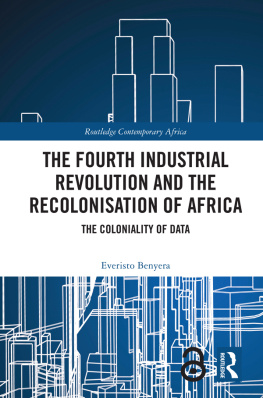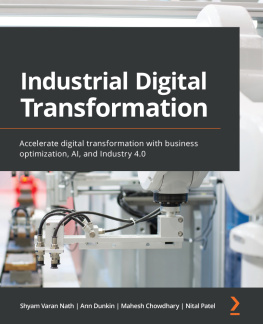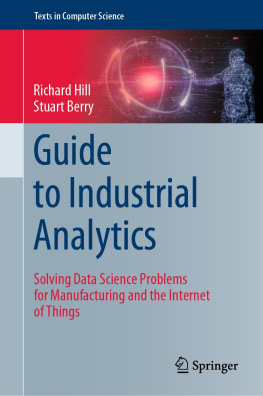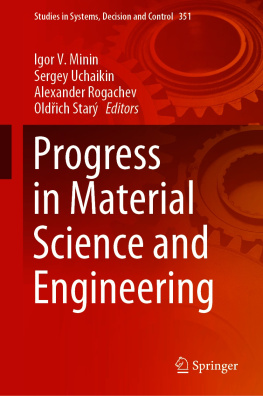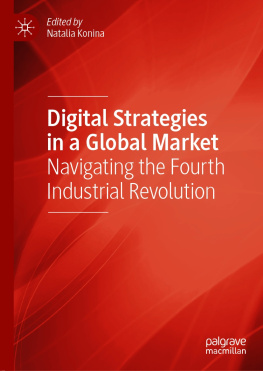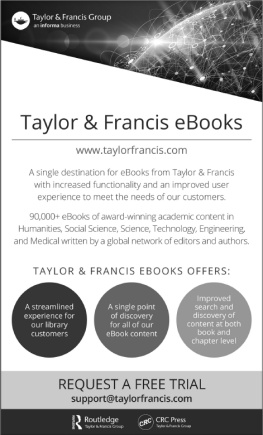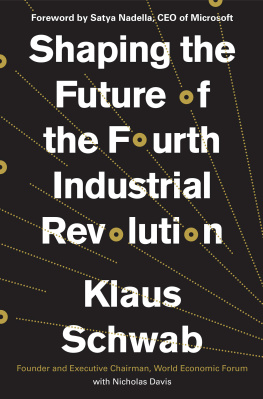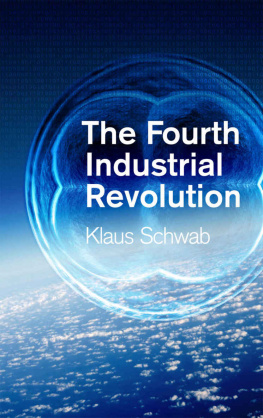Jongbae Kim - Data Science and Digital Transformation in the Fourth Industrial Revolution
Here you can read online Jongbae Kim - Data Science and Digital Transformation in the Fourth Industrial Revolution full text of the book (entire story) in english for free. Download pdf and epub, get meaning, cover and reviews about this ebook. year: 2021, publisher: Springer International Publishing, genre: Business. Description of the work, (preface) as well as reviews are available. Best literature library LitArk.com created for fans of good reading and offers a wide selection of genres:
Romance novel
Science fiction
Adventure
Detective
Science
History
Home and family
Prose
Art
Politics
Computer
Non-fiction
Religion
Business
Children
Humor
Choose a favorite category and find really read worthwhile books. Enjoy immersion in the world of imagination, feel the emotions of the characters or learn something new for yourself, make an fascinating discovery.
- Book:Data Science and Digital Transformation in the Fourth Industrial Revolution
- Author:
- Publisher:Springer International Publishing
- Genre:
- Year:2021
- Rating:4 / 5
- Favourites:Add to favourites
- Your mark:
- 80
- 1
- 2
- 3
- 4
- 5
Data Science and Digital Transformation in the Fourth Industrial Revolution: summary, description and annotation
We offer to read an annotation, description, summary or preface (depends on what the author of the book "Data Science and Digital Transformation in the Fourth Industrial Revolution" wrote himself). If you haven't found the necessary information about the book — write in the comments, we will try to find it.
Jongbae Kim: author's other books
Who wrote Data Science and Digital Transformation in the Fourth Industrial Revolution? Find out the surname, the name of the author of the book and a list of all author's works by series.
Data Science and Digital Transformation in the Fourth Industrial Revolution — read online for free the complete book (whole text) full work
Below is the text of the book, divided by pages. System saving the place of the last page read, allows you to conveniently read the book "Data Science and Digital Transformation in the Fourth Industrial Revolution" online for free, without having to search again every time where you left off. Put a bookmark, and you can go to the page where you finished reading at any time.
Font size:
Interval:
Bookmark:
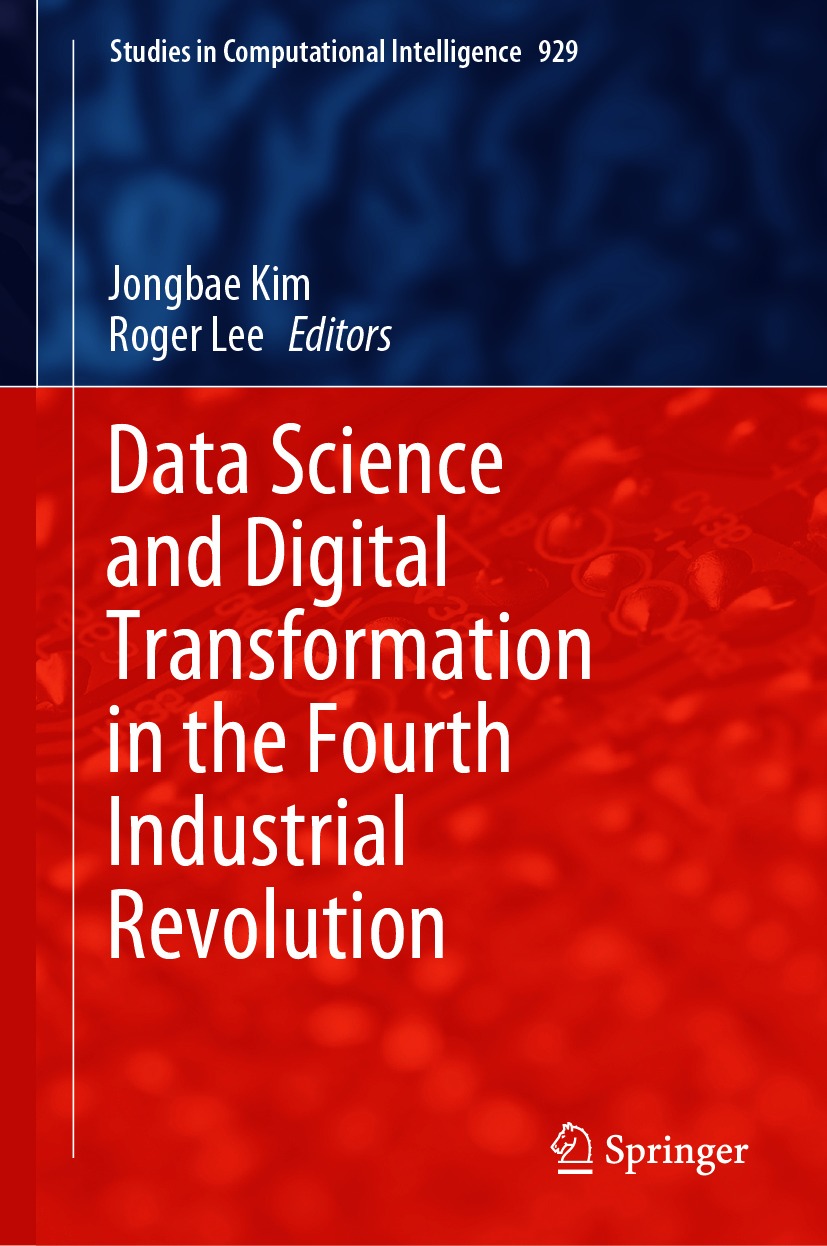
The series "Studies in Computational Intelligence" (SCI) publishes new developments and advances in the various areas of computational intelligencequickly and with a high quality. The intent is to cover the theory, applications, and design methods of computational intelligence, as embedded in the fields of engineering, computer science, physics and life sciences, as well as the methodologies behind them. The series contains monographs, lecture notes and edited volumes in computational intelligence spanning the areas of neural networks, connectionist systems, genetic algorithms, evolutionary computation, artificial intelligence, cellular automata, self-organizing systems, soft computing, fuzzy systems, and hybrid intelligent systems. Of particular value to both the contributors and the readership are the short publication timeframe and the world-wide distribution, which enable both wide and rapid dissemination of research output.
Indexed by SCOPUS, DBLP, WTI Frankfurt eG, zbMATH, SCImago.
All books published in the series are submitted for consideration in Web of Science.
More information about this series at http://www.springer.com/series/7092

This Springer imprint is published by the registered company Springer Nature Switzerland AG
The registered company address is: Gewerbestrasse 11, 6330 Cham, Switzerland
The purpose of International Semi-Virtual Workshop on Data Science and Digital Transformation in the Fourth Industrial Revolution (DSDT 2020) held on October 17, 2020, Soongsil University, Seoul, Korea, is aimed at bringing together researchers and scientists, businessmen and entrepreneurs, teachers and students to discuss the numerous fields of computer science and to share ideas and information in a meaningful way. This workshop on data science and digital transformation in the Fourth Industrial Revolution will discuss the wide range of issues with significant implications, from data warehousing, to data mining, online analytical processing and reporting, data quality assessment, data-driven business models, data privacy and security issues, etc.
This publication captures 17 of the workshops most outstanding papers. The selected papers have not been published in the workshop proceedings or elsewhere, but only in this book. We await the important contributions that we know these authors will bring to the field.
In Chapter , Harim Byun and Jongwoo Park investigate the factors influencing the intention to use Korean telemedicine services from the perspective of potential overseas customers. This study has tested the influence relationship by reconstructing the UTAUT2 model to be suitable for the studies on the acceptance of telemedicine services.
In Chapter , Yongmuk Kim and Jongwoo Park tested their hypothesis using structural equation model analysis to verify the structural relationship between dynamic capability and business performance in the smart supply chain environment of Korean small and medium manufacturers. They confirmed through this that dynamic capability and environmental uncertainty in a smart supply chain environment have a partially significant effect on business performance and that manufacturers must strive to implement direct, systematic policies and improve dynamic capability to respond to an uncertain business environment.
In Chapter , Jinyoung Yang, Hyoboon Wang and Donghyuk Jo analyze the relative importance between determinants and factors of coaching service quality. Result of this study may be used as basic data in establishing an academic knowledge system of coaching and expanding the base for coaching.
In Chapter , Seulki Lee and Donghyuk Jo explore the factors that effects the acceptance intention of technology-based self-service of food and beverage store customers. The results of this study have academic implications for investigating the antecedent variables to the acceptance intention of technology-based self-service in uncertain environments. In practice, it will contribute to decision-making and business strategy formulation for the post-corona era.
In Chapter , Saeyong Oh, Sanghyun Cho, Sunghwa Han and Gwangyong Gim propose an architecture that can verify the integrity of the blockchain-based electronic document platform by presenting a pre-validation method for electronic documents.
In Chapter , Sanghyun Cho, Saeyong Oh, Hogun Rou and Gwangyong Gim analyzed prior studies and cases of e-government in order to derive the factors influencing the continuous use of e-government services provided by central government departments, local governments and public institutions, and to establish the causal relationship between each factor.
In Chapter , Hung-Trong Van, Simon Gim, Euntaek Lim and Thi-Thanh-Thao Vo find the factors affecting the intention to use e-government by comparing Korea and Vietnam citizens behavior based on TAM and IS success model.
In Chapter , Siyoung Lee, Sungwoong Seo, Hyunjae Yoo and Gwangyong Gim analyzed articles related to virtual reality and augmented reality, the main elements of the Fourth Industrial Revolution, and reviewed the views that the media has by using text mining techniques. This study showed that topics derived from topic modeling can be expressed in strategic space both nominally and visually.
Font size:
Interval:
Bookmark:
Similar books «Data Science and Digital Transformation in the Fourth Industrial Revolution»
Look at similar books to Data Science and Digital Transformation in the Fourth Industrial Revolution. We have selected literature similar in name and meaning in the hope of providing readers with more options to find new, interesting, not yet read works.
Discussion, reviews of the book Data Science and Digital Transformation in the Fourth Industrial Revolution and just readers' own opinions. Leave your comments, write what you think about the work, its meaning or the main characters. Specify what exactly you liked and what you didn't like, and why you think so.

